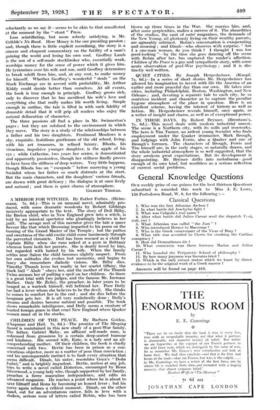CHILDREN OF THE PEACE. By Barbara Golden. (Chapman and Hall.
7s. 6d.)—The promise of The Sleeping Sword is maintained in this new study of a post-War family. The father, Gabriel Maby, an affluent self-made man, is redeemed from grossness by a certain deep-seated humour and kindness. His second wife, Kate, is a lady and an all- comprehending mother. Of their children, the book is chiefly concerned with two. Bertie has been in prison as a con- scientious objector, more as a matter of pose than conviction ; and his unconquerable instinct is to funk every situation that seems difficult. Dinah; his sister, resembles Goya's " Dofia Isabel," and is brightly impudent. Bertie, useless at any job, tries to write a novel called Distortion, encouraged by Rona Silverwood, a young lady who, though supported by her family, preaches a fierce masculine independence, and edits an advanced magazine. He reaches a point where he is about to Save himself and Rona by becoming an honest lover ; but his nerve again refuses a critical moment. Dinah, on the other hand, out for an adventurous career, .falls in love with a shaken, serious man of letters called Robin, who has been blown up three times in the War. She marries him, and, after some perplexities, makes a success of it. The absurdities of the studios, the cant of mare magazines, the demands of the New Young, all gloriously living on their wealthy parents, are agreeably satirized. Robin's conversation is exasperating and amusing ; and Dinah—who observes with surprise, " Am I a one-man woman, do you think ? I thought I was too good-looking "—by the time she goes dancing off the scene with Robin after her, has captured the reader's affection. Children of the Peace is a gay and sympathetic story, •with some acute observation of post-War psychology ; and it is dis- tinctly well written.




































 Previous page
Previous page